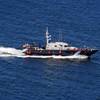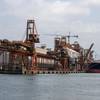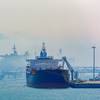Marine Terminal Operators Launch Initiative
PierPass Inc. has announced an initiative to reduce the number of transaction problems experienced when trucks pick up or deliver containers at the marine terminals at the Ports of Los Angeles and Long Beach.
These problems – exceptions from normal processes that result in the issuance of "trouble tickets" -- lead to substantial delays in container movement through the terminals.
About 5% of all transactions at terminals in the United States result in trouble tickets, which on average add about an hour to the "turn time," the amount of time a truck spends at a terminal, according to a 2011 report by the National Cooperative Freight Research Program (NCFRP). The report found that "exceptions from normal processes [are] a major source of delay and cost. The long 'tails' on the turn time data, in particular, suggest that around 5% of the cases consume much more than the 'normal' time and expense." Most trouble tickets can be prevented through better communications before a truck arrives at the terminal gates, the NCFRP report said.
PierPass has surveyed terminal operators at the Long Beach and Los Angeles ports to determine the most common causes of trouble tickets, and found that the situation at the two adjacent ports matches what NCFRP found nationally. While trouble tickets are caused by a range of issues, they usually are tied to inaccurate or incomplete information about an import container delivery or an export booking problem. When issued a trouble ticket, the driver typically has to go to a "trouble window" or office to get the issue resolved. This results in delays for customers and truckers and higher costs for terminal operators. "Trucking companies can avoid most trouble tickets and reduce turn times by checking with the terminals' web-based systems before coming to the terminal gates," said Bruce Wargo, president of PierPass. "These systems let dispatchers confirm the availability of import containers or the validity of export booking numbers before prematurely sending a truck to the terminal."
PierPass is distributing a fact sheet to trucking companies with tips on trouble-ticket prevention. PierPass today also released a video [www.youtube.com/watch?v=aqxtJGeKNb4&feature=youtu.be] in which stakeholders representing terminal operators, trucking companies and the ports discuss approaches to reducing trouble tickets.
The NCFRP report found that better procedures by trucking companies can reduce trouble tickets. It noted that less experienced drivers and trucking companies that don't regularly serve the ports generate exceptions and receive trouble tickets much more frequently than regular port visitors. Drivers making an average of at least one call per day had only a 3.0% trouble ticket rate, vs. 7.8% for those making less than one call per week, the report found.
At the APL Terminal in the Port of Los Angeles, the largest group of trouble tickets (34%) in July and August 2012 were issued when truckers arrived to pick up containers that were on hold. Containers can be put on hold for a variety of reasons including U.S. Customs release, agricultural inspection, and unpaid steamship charges or Traffic Mitigation Fees.
The second-largest group (20%) was due to the container number not matching the number on the Bill of Lading, which can also be checked online before delivering a container. In total, about 5% of all gate transactions – 2,500 in all – ended up at the trouble window. APL says 65% of all trouble tickets during that period could have been resolved before the truck came to the terminal.
In 2011, the Los Angeles and Long Beach ports, terminals and trucking community published the first comprehensive turn time study at the ports using GPS technology. It found that the median turn time inside the terminals during the period studied was 31 minutes per visit, and that 88% of trucks took less than 2 hours per visit. The study also found:
• The median time trucks spent in queue waiting to get into the gates was 20 minutes and the terminal time 31 minutes, for a total visit time of 51 minutes.
• Some have implied that it is typical to wait three hours to get into a terminal. But the study showed that only 9% of queue waits were more than an hour.
• Only 3% of visits took three hours or more, including queue time and terminal time.
PierPass and its member terminal operators continue to offer night gate operations to address container demand and traffic mitigation. Terminals are currently offering 55 OffPeak gates across 13 terminals, in addition to 65 daytime gates, for a total of 120 gates per week for cargo pickup and delivery.












